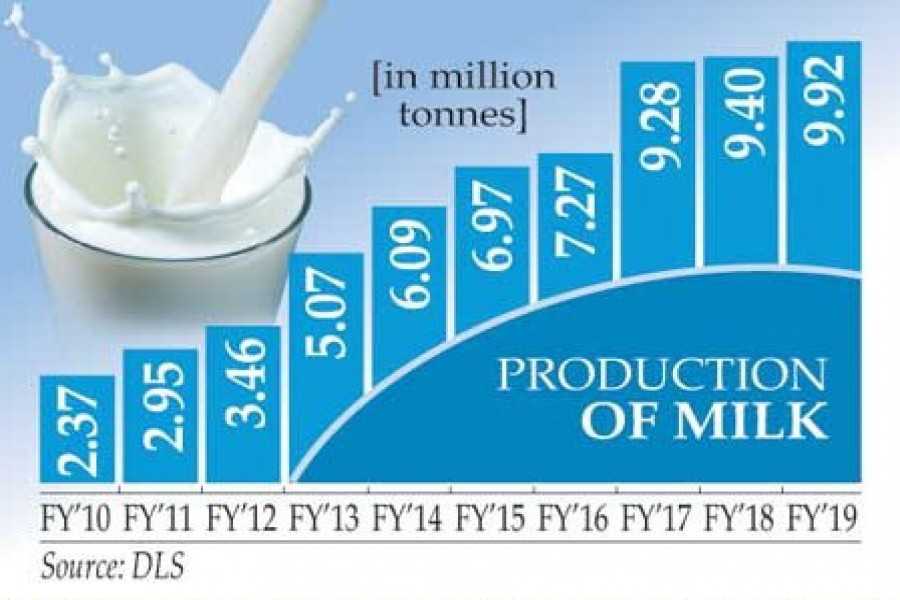Dairy industry grows, still remote the mark

Image collected
The country's dairy industry is continuing to grow over the years but it is still far off the mark to meet up the existing demand for milk for various reasons.
The production of milk surged by more than 333 per cent in the fiscal year (FY) 2018-19 from the particular level in the FY 2008-09, still far below the necessity.
The dairy farmers produced about 9.92 million tonnes of milk against the demand for 15.20 million tonnes in FY '19, based on the Department of Livestock Services (DLS).
The milk production stood at only 2.29 million tonnes in the FY '09, the DLS data revealed.
A complete of 70,981 livestock farms (ruminants) registered with the department until August 2019, the info suggest.
Of these, about 59,274 were dairy farms, 4,201 goat-rearing farms and 3,753 sheep farms.
Shah Emran, general secretary of Bangladesh Dairy Farmers' Association (BDFA), said the dairy farmers have been raising milk production sharply since FY '09 despite facing so many hurdles rather than getting enough support from the federal government.
"However, we are yet to meet up the expected demand", he told the FE.
In this connection, he urged the government to impose anti-dumping duty on powdered milk since it is hurting the local industry seriously, said Mr Emran.
The imported milk is substandard and being brought in from mostly Denmark and other European Union (EU) countries, he said.
The federal government should provide subsidy, incentives and loans to dairy farmers to greatly help produce grass and other green fodder so that milk production could be raised to the expected level, the BDFA secretary said.
Speaking with the FE, Dr. Md. Giasuddin, Head of Animal Health Research Division and Director of National Reference Laboratory for Avian Influenza (OIE Reference Laboratory) of Bangladesh Livestock Research Institute (BLRI), said the main problem with this industry at the moment is that the marginal farmers aren't getting due prices for their milk as middlemen are grabbing the larger share of the pie.
About 30 per cent of the people aren't habituated to drink milk regularly and that is another problem facing the farmers, he said.
Only 5.0 to 10 % of dairy milk has been processed, which is collected by the middlemen but not directly from the farmers. That deals a blow to the farmers, the researcher said.
About 95 per cent of the milk produced has been used in making sweets, Giasuddin said.
However, propaganda associated with dairy milk is hurting the farmers severely, he said.
Alternatively, the marginal farmers are being losers as a result of foot and mouth disease (FMD). They aren't getting adequate vaccines for their animals, he said.
As Bangladesh has now 25 million cattle, it requires 50 million vaccines each year. But the country can offer only 6.0-7.0 million vaccines, hardly any when compared to requirement, he added.
The united states needs at least 80 % vaccine coverage to save the animals and so protect the farmers from incurring heavy losses each year, Dr. Giasuddin said. He also emphasised a powerful role of the federal government to this end.
The government should motivate the private sector to import vaccines as required from abroad, the animal health expert said.
Smuggling in live animals from neighbouring countries should be halted fully, he added.
Dr ABM Khaleduzzaman, DLS assistant director (farm), said the F1 hybrids which are offspring of the high yielding cattle brought from abroad aren't yielding the expected level of milk. Therefore the country is witnessing such a deficiency.
An F1 hybrid (generally known as filial 1 hybrid) may be the first filial generation of offspring of distinctly different parental types.
The department has undertaken various projects to eliminate the FMD, mastitis and peste des petits ruminants (PPR) which is also referred to as 'goat plague' from the united states, he told the FE.
Through the projects, the DLS should be able to enhance its monitoring at the grassroots level, the assistant director said.
He also mentioned the DLS is trying to improve the vaccine coverage up to 70-80 %.
Dr Khaleduzzaman laid focus on increasing production of vaccines locally, strict monitoring at the field level, cattle movement control, creating awareness and stopping cattle import from other countries.
Source: https://thefinancialexpress.com.bd
Tags :
Previous Story
- Singapore's Bangladeshi personnel have eyes on home as...
- Govt forms seven committees to oversee development of...
- Government urged to safeguard migrants, diaspora communities
- Bangladesh economy to overtake Malaysia, Singapore in four...
- ‘Exciting time for increasing already-strong US-Bangladesh trade and...
- Your phone battery isn't changing any time in...
- Plastic wastes no more a bane but a...
- UH Economists Say Coronavirus Poses Danger To Hawaii...